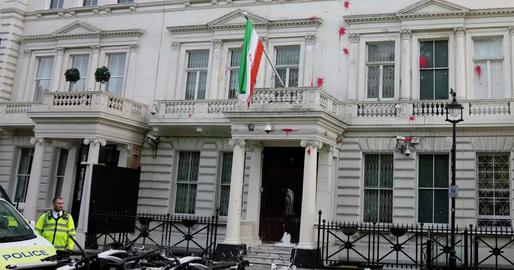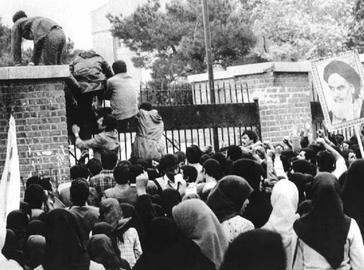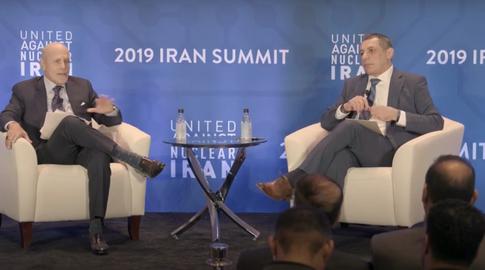With the continuing anti-government protests in Iran triggered by the death of Mahsa Amini, some supporters of the protesters have suggested that diplomatic compounds of the Islamic Republic in foreign countries should be occupied.
Is this legal? If not, then why after the 1979 Islamic Revolution were Iranian embassies occupied by the followers of Ayatollah Khomeini?
On the ninth day of protests in Iran, a large group of Iranians gathered outside the embassy of the Islamic Republic in London and clashed with police who were protecting the embassy. Protesters then moved to the Islamic Center of England, affiliated with Ayatollah Ali Khamenei, climbed the building and brought down the flag of the Islamic Republic. Twelve protesters were arrested and at least five police officers were injured.
British police were protecting the embassy and other sites not because the British government supports the government of the Islamic Republic but because, under the Vienna Convention on Diplomatic Relations, it has the duty to protect diplomatic premises. Article 22 of the convention clearly states that the host government has “a special duty to take all appropriate steps to protect the premises of the mission against any intrusion or damage and to prevent any disturbance of the peace of the mission or impairment of its dignity.”
In some cases, the host countries extend this diplomatic immunity even to non-diplomatic premises, such as the Islamic Center in London or the offices of the representatives of the Supreme Leader outside Iran, the same way that the British Council, a British organization specializing in international cultural and educational opportunities, is protected in other countries.
Due to this diplomatic protection and immunity, if opponents of a government attack such premises or try to occupy them, whatever their reasons, the host government would immediately take the necessary measure to protect the premises and would arrest the attackers. Failure to do so would damage and undermine the political credibility and standing of the host government, like the Islamic Republic itself that has failed to protect foreign diplomatic embassies and other premises in Iran.
Regardless of how much a certain regime or government loses legitimacy and the support of its people — like the Islamic Republic at this moment or the Syrian government of President Bashar al-Assad earlier — host governments cannot allow its diplomatic premises to be occupied or even attacked by its opponents. Therefore, the idea of attacking or occupying the embassy of the Islamic Republic is a gamble that is doomed to failure and would portray the protesters as a violent mob that behaves outside the framework of the acceptable behavior of seekers of liberty.
After the attack on the Islamic Center in London, a member of the British House of Commons said that Iranians are doing damage to Britain because of their own domestic differences. When seen next to the pictures of attacks on foreign embassies in Tehran, this episode undermines the credibility of those who claim to oppose a government that failed to do its duty to protect diplomatic missions on its soil.
Until a government has not fallen, host countries have “a special duty” to protect diplomatic premises that they host. And if that government falls, the host government must protect the assets and the properties of that government until it can hand them over to the representatives of the new legal government.
Now we must answer this question: How did the supporters of Islamic Revolution succeeded in taking control of the embassies of the Iranian Imperial government in February 1979? In some cities, including in Washington D.C. where one of the most important Iranian embassies was located, supporters of Ayatollah Ruhollah Khomeini, the founder of the Revolution, had already created “parallel” embassies.
These parallel embassies might not have been able to conduct meaningful diplomatic activities. But creating such an embassy was a non-violent means of introducing supporters of the revolution to host governments and for laying the groundwork for transferring the official embassy as soon as possible. Moreover, it had an important symbolic value for the supporters of the Revolution because, instead of clashing with the police outside the embassy, it could even provide them with some measure of credibility with the host government.
It was only after the Shah’s government fell that supporters of the Revolution were allowed to take physical control of Iranian embassies. The revolutionaries had prepared themselves for this event and, after the interim government took over in Tehran in February 1979, it presented them to host governments as its official diplomatic representatives.
This was how the Iranian embassy in the American capital came under the control of the revolutionaries. Afterwards, members of the Students Islamic Society in the US who were in contact with the revolutionaries gradually took over Iranian consulates in various American cities.
At the time of the revolution, Mohammad Javad Zarif, who later became the foreign minister of the Islamic Republic, was studying in San Francisco and Mohammad Hashemi, Akbar Hashemi Rafsanjani’s half-brother, were members of the Students Islamic Society who took control of the Iranian consulate in California.
To sum, if the current government exists in Tehran, the idea of occupying Iranian embassies, consulates and other diplomatic premises in various countries is doomed to failure and is a lose-lose proposition for the protesters.
visit the accountability section
In this section of Iran Wire, you can contact the officials and launch your campaign for various problems

























comments